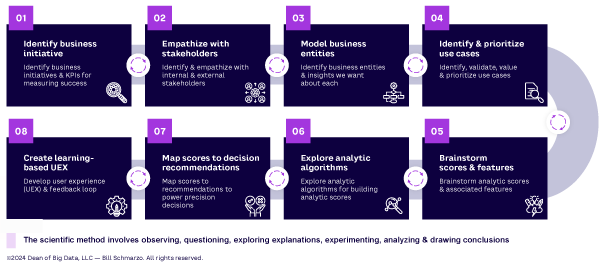Having established the economic imperative of shifting our focus from cost-cutting to value creation, we now need a collaborative, design-centric, human-empowered framework that can help organizations leverage AI to create new sources of customer, product, service, and operational value. Welcome to the “Thinking Like a Data Scientist” (TLADS) methodology (see Figure 1).1 TLADS integrates design thinking, data science, and data economics to enhance decision-making and redefine how we perceive and capitalize on business opportunities. It is built on the following three fundamentals.

1. Design Thinking Fuels Imagination & Innovation
With its core emphasis on user-centric problem-solving, design thinking plays a pivotal role in maximizing GenAI’s potential. It prompts organizations to think beyond traditional boundaries, fostering an environment where innovation is encouraged and inevitable. By applying design thinking to AI development, companies can create solutions that are not only technologically feasible but also profoundly aligned with fundamental human needs and market demands. This alignment is crucial for developing AI-driven products and services that resonate with users and deliver sustainable economic value.
2. Data Science Is the Backbone of Scaling Innovation
Data science is central to unlocking AI’s economic potential. The rigorous analytical processes and advanced modeling techniques in data science help businesses extract actionable insights from vast amounts of data. By systematically applying data science principles, organizations can predict trends, personalize customer experiences, and optimize operations — each an avenue for significant economic innovation. Moreover, data science ensures that AI initiatives are based on empirical evidence, enhancing their credibility in driving business value.
3. Data Economics Drives Sustainable Value Creation
Data economics provides the framework for understanding and quantifying data’s value to business processes. In the context of AI, this means identifying how information assets can be transformed into economic gains. By applying data economics principles, organizations can measure the impact of data reuse, sharing, and innovation on their economic performance. This approach (1) helps maximize the ROI from data assets and (2) aids in crafting strategies that leverage AI for increased revenue and competitive advantage.
These fundamentals lay the groundwork for businesses to explore and navigate the complexities of deploying AI to deliver more accurate and meaningful outcomes. The synergy among these disciplines encourages a holistic view of AI’s role within the business ecosystem, emphasizing sustainable value creation over short-term gains. This allows companies to adapt to the evolving economic landscape and drive forward-thinking innovations that redefine their industries.
Note
1The second edition of the TLADS methodology introduces several improvements over the original version, focusing on a deeper integration with AI capabilities. It enhances guidance on leveraging big data and AI technologies to refine decision-making processes, ensuring that data-driven insights are more actionable and directly aligned with strategic business goals. The updated edition also expands on collaborative tools and techniques, facilitating greater cross-departmental collaboration and innovation, which are crucial for implementing a data-centric culture within organizations.
[For more from the author on this topic, see: “Unleashing Business Value & Economic Innovation Through AI.”]



